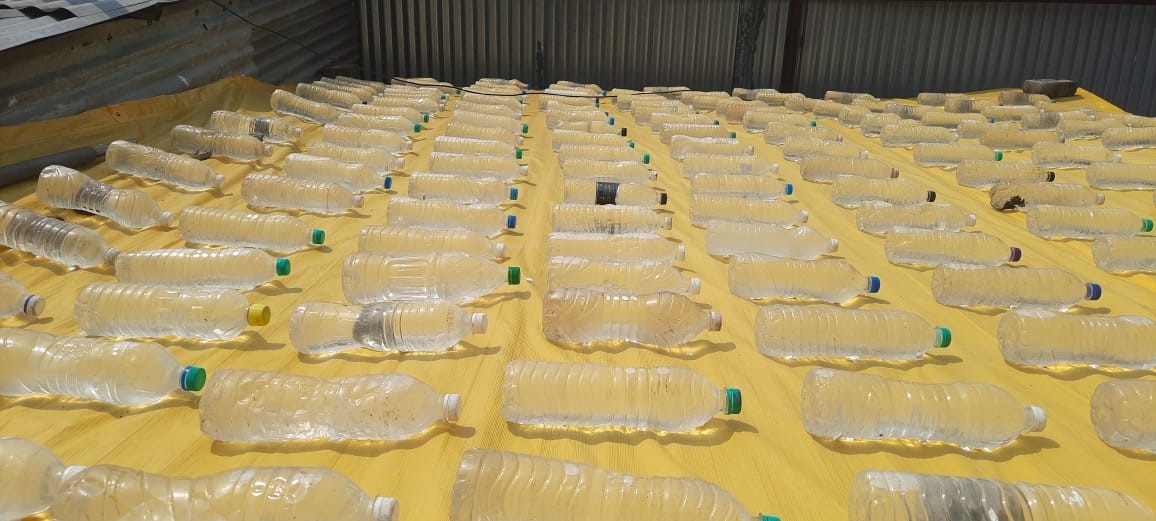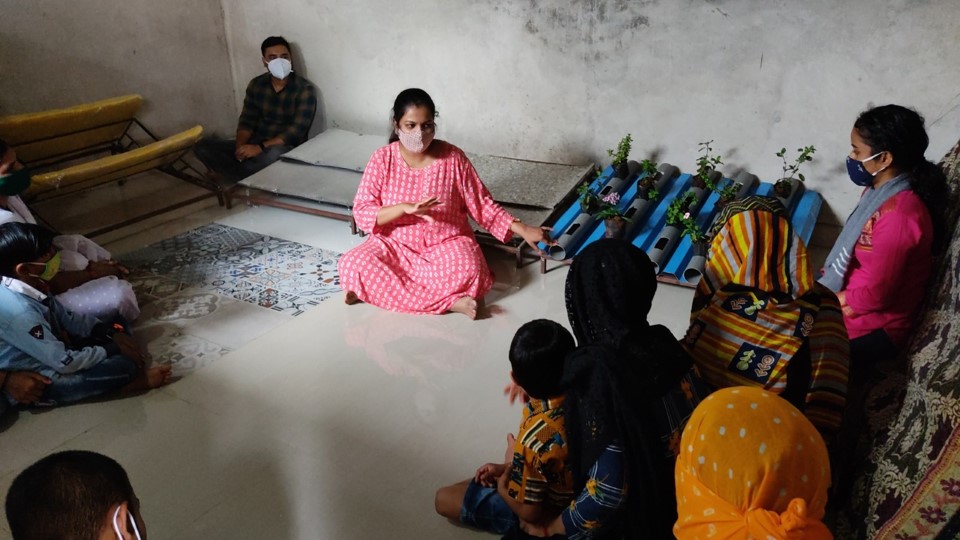
Consultancy cBalance is working with women in urban neighbourhoods to understand how they are affected by heat stress – and to install the practical low-carbon solutions that can address the challenge.
Pune and Bangalore, India
Visit cBalance’s website for more information
In fast-urbanising India, less wealthy communities are at greatest risk from rising temperatures. One quarter of city residents live in packed neighbourhoods and cramped homes with little ventilation, often made from materials that trap heat.
These conditions damage people’s physical and mental health, and make it harder to study or earn a living. Women – more likely to work and spend time indoors – are most affected by the problem.
Affordable, sustainable, locally appropriate measures can help even very poor families lower the danger of extreme heat. In the cities of Pune and Bangalore, social enterprise cBalance has worked closely with women in low-income communities to design and install such solutions. These range from coverings made of recycled to waste to rooftop gardens, and are already bringing benefits to families.
Students from local universities have been at the heart of this activity, leading workshops and meetings with affected communities. This has given tomorrow’s architects and engineers a rare chance to understand the lives and needs of marginalised people. CBalance has also produced tools and resources to guide this process in the future – and help other organisations achieve success.
The initiative was funded by Ashden’s Fair Cooling Fund from 2020 and 2022, and cBalance has already secured investment to continue the project.
In the years ahead, the organisation aims refine its designs and bring their benefits to more homes. The organisation will also work to put sustainable and affordable cooling on the curriculum at universities and colleges, and bring together important voices – from community groups to politicians – to tackle the heat stress problem.
Mother-of-two Mangal Sanjay Shinde lives in a 4.5 by 3.7m one-room home in Pune. The structure has a tin roof and walls, and no ventilation. Previously, the families only options for lowering temperatures were to spend money running an electric fan and to wipe the floor down with water, which cools their home for an hour or so.
CBalance helped Mangal install a layer of 180 water-filled plastic bottles on the roof, which has lowered temperatures significantly. This is one 30 home upgrades carried out with support from the Fair Cooling Fund.
Mangal says: “We used to sit outside the house from 12 pm to about 4 due to the unbearable indoor heat. However, we can sit indoors now.
Mangal is a tailor, and a cooler home will help her be more productive. She says: “I have the flexibility to work whenever I want now. I can sew in the morning and evening.”
She is pleased the bottles have been installed in a way that allows rainwater to run off the roof, reducing flood – and says that if the family move, she would install a similar solution in their new home.

The students working with communities have included Shruti Shrivastava and Manasi Jadhav from Mahashi Kalways Three Stanta University in Pune.
Shruti says: “Women had lots of questions about our proposed solutions. What happens during extreme weather? Will it cause a problem when cooking? how will it be maintained? Will it be safe for children and older people?
“These are knowledgeable people, and we have to understand and respect this. As designers, we always think we know better. This was humbling.”
Residents rejected ideas that were overcomplicated or expensive and time-consuming to maintain. Other local concerns included making sure homes were not left vulnerable to rats, snakes and other pests.
Engaging with communities was a reality check, says Manasi. “This was the first time we stepped out of our bubble as part of our course. Interacting with the communities has stayed with me. It will help me in the long-run not to assume things, and really design for the end users.”
Both agree the process was not simple or straightforward, but ultimately rewarding. “I still remember walking inside a house and feeling the change in temperature because of one of the solutions,” Shruti says.

CBalance founder Vivek Gilani says that, given the intrusive nature of the project, engagement was needed over many months to build understanding and confidence between all parties, and allow people to raise concerns.
He explains: “We are intervening in people’s homes, in their living space. They are not an object.” He cites the importance of working with local NGOs to win the trust of communities, and to meet local needs, such as scheduling workshops and meetings to avoid local festivals.
CBalance has developed material to help others learn from the initiative and repeat its success. This includes resources for community engagement and education, tools for assessing heat stress in informal homes, technical drawings, and recommendations for the influential ‘boards of study’ that shape academic curriculums.
Huge challenges remain – such as the lack of basic household-level data about the lives of communities most affected by heat stress, and the state of their homes. CBalance has also liaised with legal experts to understand how home upgrades could see buildings and land be reclassified from a planning perspective, something that could have serious consequences from residents. As global temperatures rise, so will the danger facing marginalised urban communities, in India and beyond. Vivek and his colleagues are committed to a response rooted in empathy and deep engagement with those most at risk.
T: 0207 4100330 E: info@ashden.org
The Peak, 3rd Floor 5 Wilton Road, London, SW1V 1AP
Registered in England and Wales as a company limited by guarantee.
Registered number: 05062574/ Charity number: 1104153
See our privacy policy.
This site uses cookies to provide you with the best user experience. By using the Ashden website, you accept our use of cookies.
Stay up to date